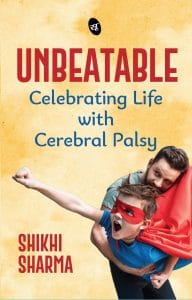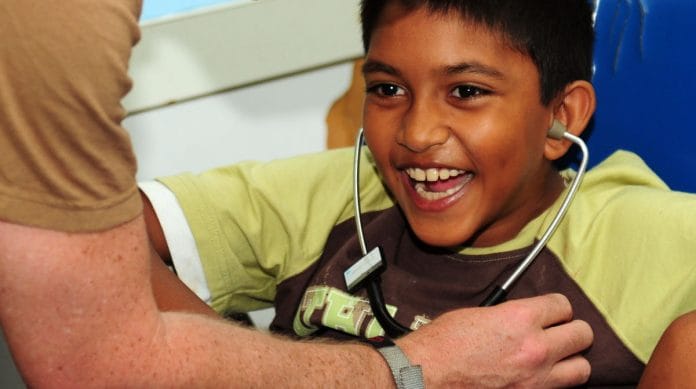Other parents get rejection letters when the child enters into a college. In Tapasvi’s case, the rejections started rolling from the first standard itself. I appealed to every school in Jaipur city to enrol my child, but all of them rejected the application without even having a conversation with him. I was tenacious about giving him a proper, formal education, but where could I possibly send him?
There was no school which was ready to admit him. All the big schools claimed to admit differently-abled children, but reality was very different. I tried getting Tapasvi into many of
these schools, but no one admitted him, saying that they lacked the staff and resources to support him.
Sometimes, the school would take him for seven days but they would send him back home with a reparation letter, stating:
‘Sorry Mr Sharma, your ward cannot pursue his education in our school.’
There was no explanation given from these schools. It was just these piles of letters that followed. These letters stripped me of my confidence, but more than me, they broke my child. Here was a small boy who had battled cerebral palsy and dyslexia to be able to read and write, and even after all his efforts, he was being turned down.
In the face of all these rejections, I thought Tapasvi was getting dejected too. It was a natural conclusion, as I was in the same frame of mind. But in due time, he proved me wrong. In lieu of giving up or breaking down with us, he got galvanized to prove himself.
Also read: IIT Madras designs 2 devices costing under Rs 5,000 for people with hearing & motor disabilities
For once I thought about giving up on his education and trying to focus on the physiotherapy. There was a nagging feeling in my mind that when he’ll be able to walk to the school, none of these institutions would rebuff him. Would not say no to admitting him to the school. But Tapasvi did not agree with my assessment of the situation. He was hell bent on getting a proper education.
During one of the bi-monthly visits to the physiotherapist, we got to know about an NGO and a school for differently-abled children. Without wasting any more time, we went to visit the school. It was perfect for my child. It had slopes with handlebars on the top to enable children to walk on their own.
There was a physiotherapist available, along with a competent medical staff. But there was another issue; there were no openings. The school had reached its maximum admission capacity and there was no scope of any new admissions. I pleaded, but in vain. Eventually, they offered me a home course on how to teach your child at home.
We used to be called to the school monthly and were coached on how to take care of a child with cerebral palsy, dyslexia and other disorders. While his education started shaping up by then, we never lost our focus on his physiotherapy. Tapasvi was taken to a speech therapist to help him with his ineptitude to swallow and to control his drooling, Parul ma’am meticulously worked upon his writing and we concentrated upon small gimmicks of
his daily life.
I wanted my child to be complete, I wanted him to know everything and I wanted him to have friends he could talk to.
After a time span of about six months, we got a written communication from the school stating that Tapasvi could now officially join the school. The epistle stated that we had to buy books and a new school dress for Tapasvi. It is rather strange but the small event of buying a new school dress brought great happiness to me.
Tapasvi was really happy the first day he returned from the school. The school was a positive, vibrant place full of lush greenery. It had lots of swings and toys that were specially designed for differently-abled kids. It had paintings on the walls and specially contrived seating arrangements.
As Tapasvi started his new journey, time became a major concern for me. Since everything with Tapasvi took double the time and effort, I started losing out on certain tasks that I had to complete. I wanted to pay attention to Tapasvi’s growth, wanted to give my whole time to him, but that was not something I could do at leisure.
There was physiotherapy, Tapasvi’s school, my office, my wife, my parents, my family and another child to take care of. I had started feeling that everything was taking a backseat because I was too busy concentrating on Tapasvi. Till date, I give the whole credit of taking care of Manasvi to my wife. I cannot imagine how Manasvi dealt with this experience as a child, of getting most attention from one parent and only some from the other. He must have felt left out, untended, but he never once expressed it. Perhaps that is how we all sacrificed a bit of ourselves to make up for what Tapasvi was not given by nature.
Also read: Haider Ali, the Pakistani gold medalist who bunked classes for long-jump training
With the passage of time, I started becoming more occupied. I didn’t have any time for myself or for Manasvi. Tapasvi had always been an assiduous child, but could not accomplish tasks without assistance. As time started becoming a major constraint,
I started feeding Tapasvi as we walked about in the house, holding bars. I would read the newspaper while doing exercises. When I left from office, I called up my wife to get a glass of water and a cup of tea ready for me, so that I don’t waste any time. Given the value of time as we had come to see it, even a phone call seemed like a waste of time.
Inevitably, I found myself getting cut off from my social circle, simply because I could not afford to devote time to them. There was nothing in my capacity that I did not try with Tapasvi. I would mix kidney beans and garbanzo beans for Tapasvi to sort to work on his eye-hand coordination, a pot would be kept medially in his legs to make sure they do not intersect. I ligatured a pillow to his legs at night so that the day’s exercise did not go waste.
At an age when the other kids were unearthing new toys to play around with, my child was handling exercise instruments. I made him do some sovereign activities, took him for horse riding, swimming classes and even made him walk in the sand which was quite impractical for a guy suffering from cerebral palsy. Now when I look back, sometimes I feel that I overdid a few things. He never complained, never uttered a word, but I shudders to recollect what all he underwent because of the insistence with which I compelled him to succeed. I felt I was becoming everything my son needed – a father, a mentor, a guide, a therapist, a doctor, a trainer, a tutor. In all this rush, I forgot to become his friend.
 This except has been taken with permission from Srishti Publishers.
This except has been taken with permission from Srishti Publishers.






